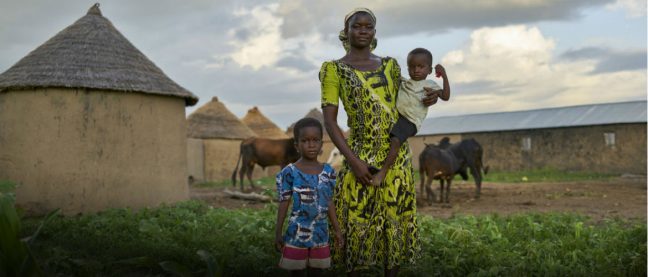Poverty is a complex problem with many causes. But when you break it down, sometimes the best solutions are remarkably simple — like compost.
In northern Ghana, generations of over-farming have left the soil dry and barren. With every harvest, vital nutrients are depleted, making it harder and harder for farming families to grow enough food to eat and sell.
For proud parents like Christina (pictured below), health and happiness ride on the success of each harvest. A failed harvest can push the whole family into poverty.
Christina says, “Poverty is when one doesn’t have enough food and you don’t have enough money to buy the food … You don’t have the means to get what you want, to lead a normal life.”
Christina knows the stress and strain of poverty too well. Defiant, she says, “I have hope that one day we leave poverty behind.”
Like many women in the region, Christina’s work is never done. After tending the maize fields each day, she fetches water, bathes the children, and cooks and cleans for her family.
She says, “What keeps me going is the fact that I want a future with hope … I must put food on the table, and I must make sure that the children grow up and are not in need — that’s the motivation to keep on.”
She puts in long hours on the land: “It’s hard work but if you get a good harvest, it’s very nice. The only thing is if you work hard and don’t get a good harvest, then it’s not good.”
Each season, as the land grows more and more parched, Christina faces the very real threat of a failed harvest — and with it, the threat of poverty also looms.
Thankfully, we know one surprisingly simple and sustainable solution for Christina’s challenges: compost.
When farmers know how to make compost, they can enrich their soil and grow more food to feed their families. So we’re empowering farming families with the tools and knowledge they need to start turning their food scraps and animal manure into compost.
We’re teaching people like Mmalebna (pictured below) how to make compost by layering available refuse — including fresh grass, hay, ash and manure — with water. The farmers also receive pickaxes to dig their compost pit; shovels to collect the compost; and wheelbarrows to transport it around the farm.
Mmalebna says, “I got a shovel and a pick axe. As a farmer, I can’t do the compost without the tools … I also use the shovel to cut the compost.”
The future looks brighter for Mmalebna now that she has the practical skills and know-how to make nutrient-rich organic fertiliser.
She says, “The project has changed my life and my hope is that there will be more interventions in the community.”
Among the Ghanaian farmers who have started composting, yields of maize and other local crops have improved by up to 1000%.
These impressive results show that, with the right care and nurturing, once barren soils can sustain life for another generation, so hardworking people like Christina can leave poverty behind.
Help families like Christina’s leave poverty behind
Your gift can provide struggling families in Ghana with the tools and know-how to turn their household waste into nutrient rich soil and improve their harvests.
